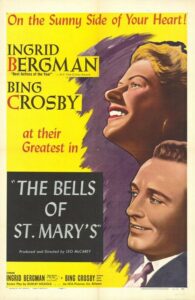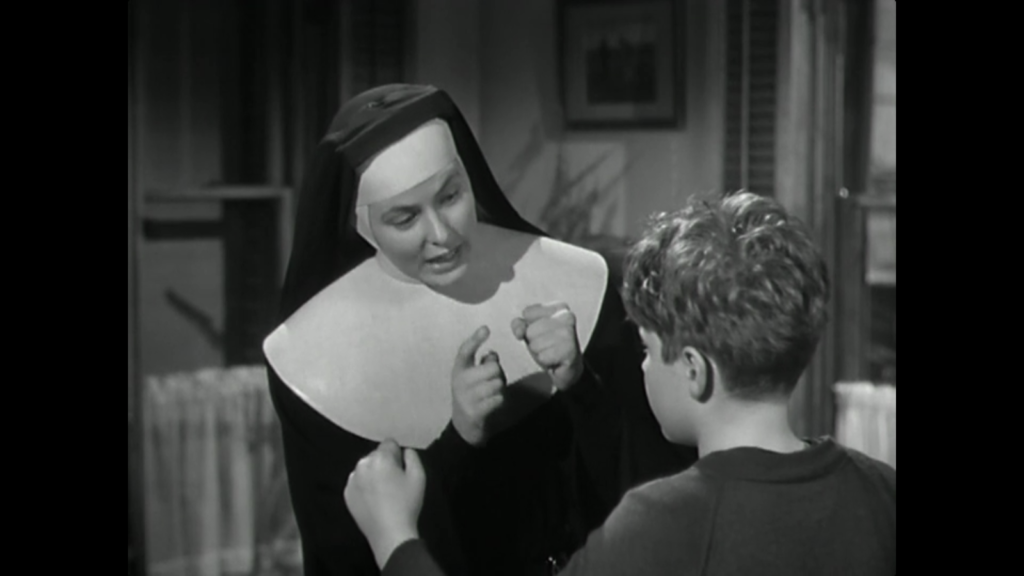Bells of St. Mary’s, The (1945)
“It looks like St. Mary’s is in a bad way.”
|
Synopsis: |
|
Genres, Themes, Actors, and Directors:
Response to Peary’s Review: The fact that this dated, overly sentimental film still remains of interest at all rests solely on the capable shoulders of Bergman, who, “more beautiful than ever — whether teaching a young boy to box or just reacting to good news from Crosby or Travers — is simply magnificent”. Her performance is head-and-shoulders above the material she’s given to work with, which unfortunately simply involves more of the cloying do-gooder vignettes evidenced in Going My Way. Here, Crosby and Bergman are committed (in different ways) to helping the teenage daughter (Joan Carroll) of a “single mother” (Martha Sleeper) whose musician-husband (William Gargan) walked out on them years earlier; will Crosby locate said “missing father”, and help facilitate an unrealistically happy reunion? What do you think? Meanwhile, the entire subplot revolving around Travers’ sudden change of heart simply defies belief. Regardless, film fanatics may want to check this one out once, simply for Bergman. She’s marvelous. Redeeming Qualities and Moments: Must See? Links: |


One thought on “Bells of St. Mary’s, The (1945)”
Not a must.
~and not sure where to begin with this one, in terms of Peary’s account of it. My instinct is to approach it with a sense of amusement. Mainly since he states that ‘Bells’ “doesn’t reach the glorious heights of the original”. Um…seriously? “Glorious”? Even if someone likes ‘GMW’ (which I don’t – at all; I find it a miserable piece of work), I doubt the person would go so far as to include ‘glorious’ in a favorable review. …Unless the person is a die-hard Catholic (which, admittedly, I am not).
Prior to posting a review here of ‘GMW’, I could not even get through the whole (to me, torturous) film. I had seen it before and that was more than enough. So, clearly, I was going to hesitate giving ‘Bells’ another look.
Imagine my surprise at being able to get through the whole thing, at least – without feeling particularly pained by the experience.
Obviously, there are reasons for that. ‘Bells’ has the main plus of being scripted by Dudley Nichols. This little not-so-incidental results in a world of difference. Whereas ‘GMW’ is cloying beyond belief, ‘Bells’ gives us some distance from Catholic dogma, so that the film leans more toward being simply humanitarian. Nichols finds room for significant examples of (sometimes heartwarming) non-sectarian humor, as well. And, because the script is generally strong, no one (not even the director) has to push the audience into treacly territory.
Even Crosby (who I am hardly a fan of) comes off to better advantage in the sequel, appearing more at ease and delivering a thoughtful performance (though I could easily do without the songs selected for him, which threaten to throw us back into very drippy surroundings).
The film has yet another advantage via the addition of some solid performances in the supporting cast: Carroll, Ruth Donnelly as the delightful Sister Michael, Rhys Williams as Dr. McKay, and the always-welcome Una O’Connor as the housekeeper Mrs. Breen.
I don’t find the film dated for any reason – but I don’t see it as a Christmas film either, just because there is a sequence involving rehearsal for a Christmas play. The latter, by the way, is one of the film’s two genuine highlights (those young kids practicing the search for a stay at an inn are hilarious). The other quite memorable scene comes when Bergman is teaching the young boy to box (the two of them seem to be really enjoying this bit and it shows).
For me, the first half of ‘Bells’ is more effective; the film’s episodic nature ultimately causes momentum to slip. The best news is that, to appreciate ‘Bells’, it is not at all necessary to first see ‘GMW’. One can certainly thank God for that!
(It should also be noted that the recently released blu-ray – which is what I saw prior to posting this – also helps in making the viewing a more pleasurable experience, overall.)